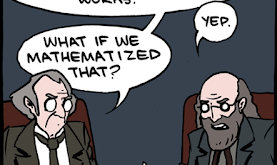With friends like this... This is NOT a review of the Smiths (the band), and neither of (or at least not a full one) of Glory M. Liu's (relatively) new book Adam Smith's America: How a Scottish Philosopher Became An Icon of American Capitalism. For a proper review go read Kim Phillips-Fein's one. In a sense, the book remind me of Bernard Shaw's famous saying that UK and the US were two countries divided by the same language. Here the gap is between fields, and there are two gaps, one within...
Read More »Paul Cockshott — 3 Bad Objections To the labour theory of value
Since various economics professors noticed that Marxists had been publishing articles showing, from empirical data, that the labour theory of value was right[ 5,3,4,6,1 7,2 ], they have felt the need to come up with objections. Whilst in the past the objections economists raised to the labour theory of value were purely abstract and theoretical, now they had a harder job. They now had Marxists producing actual figures which they had to cast doubt on. The objections raised by economists...
Read More »Finance, Class, and the Birth of Neoclassical Economics: The Marginalist Revolution Revisited — Yair Kaldor
Value theory in economics. Economic Sociology and Political Economy Finance, Class, and the Birth of Neoclassical Economics: The Marginalist Revolution Revisited Yair Kaldor | PhD candidate in the sociology department at the University of Wisconsin-Madison, and a member of Koah LaOvdim (“Power to the Workers”), an Israeli labor union.
Read More »Labor Complexity in Relation to Aggregate Marxian Value — Peter Cooper
Classical economics, including Marx, focused on economic value in real terms, i.e., a non-monetary ground for economic value expressed in markets in nominal terms as prices. That recognized that value is based on some "good" that is actual rather than nominal. One way to do this is through a numéraire, such as gold or silver. A problem here is that monetary metals don't have actual economic value in real terms that isa determinative in production. Rather, their nominal value is...
Read More »On Karl Polanyi and the labor theory of value
The other great transformation I have discussed Polanyi on the blog before, but not in great detail (see this video posted a few years back from Fred Block for a more in depth discussion). However, writing about Bob Heilbroner's views of economics, and in particular the labor theory of value, reminded me why I have reservations about Polanyi, something that often surprises my friends, since I often cite some of his ideas, and I did put his book on the Top 10 list.Polanyi has been,...
Read More »Peter Cooper — Currency Value in Terms of Socially Necessary Labor
An economy’s minimum wage equates a unit of the currency to an amount of labor time. For instance, in marxist terms, a minimum wage of $15/hour sets a dollar equal to 4 minutes of simple labor power. At a macro level, this enables currency value to be defined in terms of simple labor. There are, however, at least two ways in which this connection between currency value and labor could be drawn. One way would be to adopt a labor command theory of currency value. In effect, modern monetary...
Read More »Peter Cooper — Developments in Value Theory
Previously I have discussed how Marx’s well known aggregate equalities have been shown to hold under single-system interpretations of his theory of value. In the July 2018 edition of the Cambridge Journal of Economics, there is a noteworthy paper by Ian Wright that reconciles the classical labor theory of value with Marx’s prices of production within a dual-system framework. As with single-system interpretations, Marx’s equalities also hold under Wright’s approach. However, they do so in a...
Read More »Steve Keen — Karl Marx sacrificed logic on the altar of his desire for revolution
Karl Marx, the committed revolutionary, once proved that the revolution need not happen. What did he do next?Marx was a committed revolutionary, so much so that when reflecting on his life, he said that if he had it all to do over again, he would still be a revolutionary but would not marry, to save his wife from having to suffer the privations of life with him. There were, of course, many committed revolutionaries in the 19th century. What set Marx apart from them all was that he had...
Read More »Marx Today
As the 200th anniversary of Marx’s birth gets closer, a host of conferences, articles and books on the legacy of Marx and his relevance today are emerging – including my own contribution. The most interesting was a speech last week by the governor of the Bank of England, Mark Carney in his homeland of Canada.... Michael Roberts BlogMarx 200: Carney, Bowles and VaroufakisMichael Roberts See also The Guardian — The Long ReadYanis Varoufakis: Marx predicted our present crisis – and points...
Read More »Robert Vienneau — Marx Versus Classical Economics — and more
Robert Vienneau approaches thinking about Marx in relation to previous economists from the perspective of the different distinctions that Marx drew. This is entirely consistent with Marx's training in philosophy, since a cardinal principle of philosophical method is overcoming apparent difficulties in expression by drawing distinctions. This involves changing the grain of the model. A grainy model has the advantage of simplicity but risks the disadvantage of being too simplistic an...
Read More » Heterodox
Heterodox

